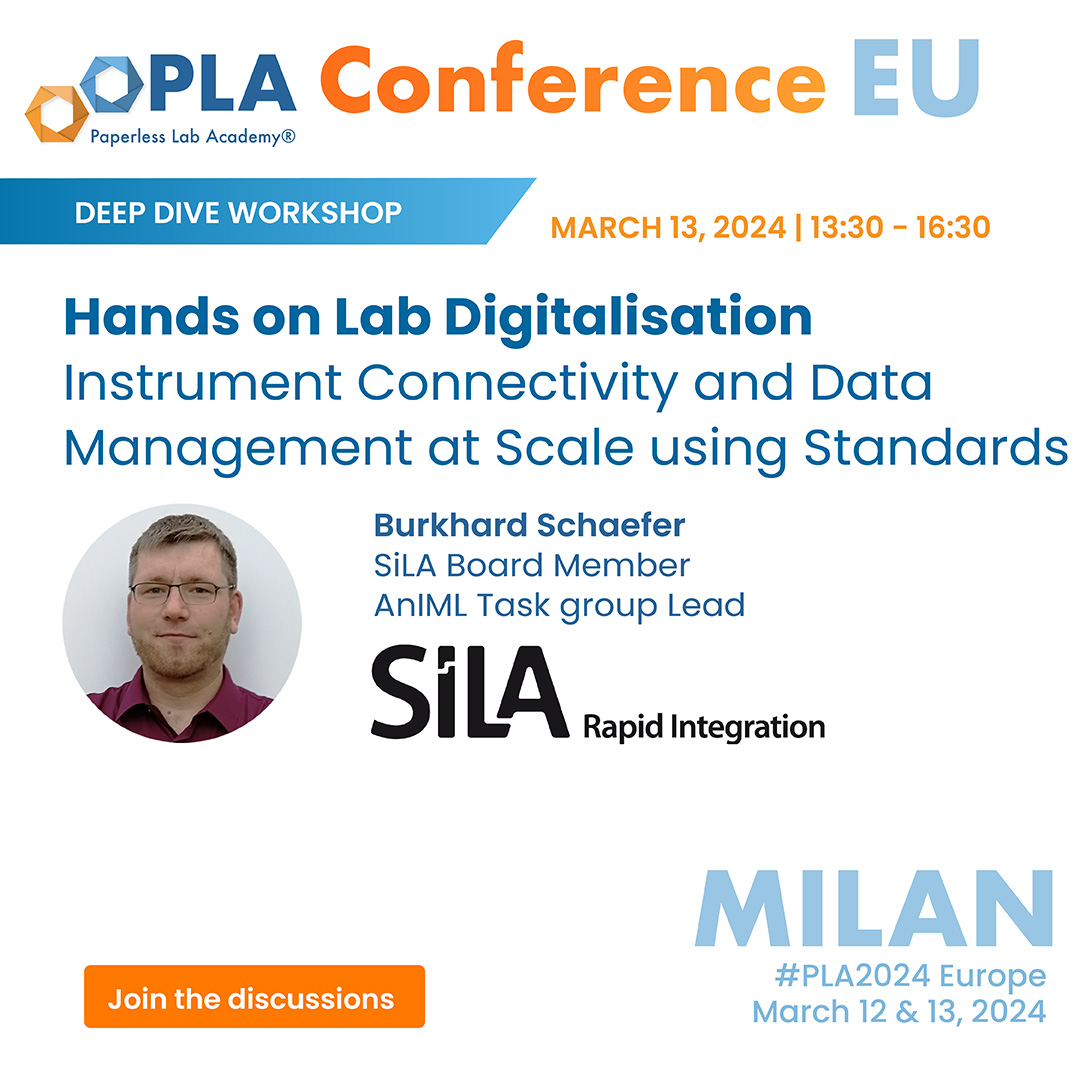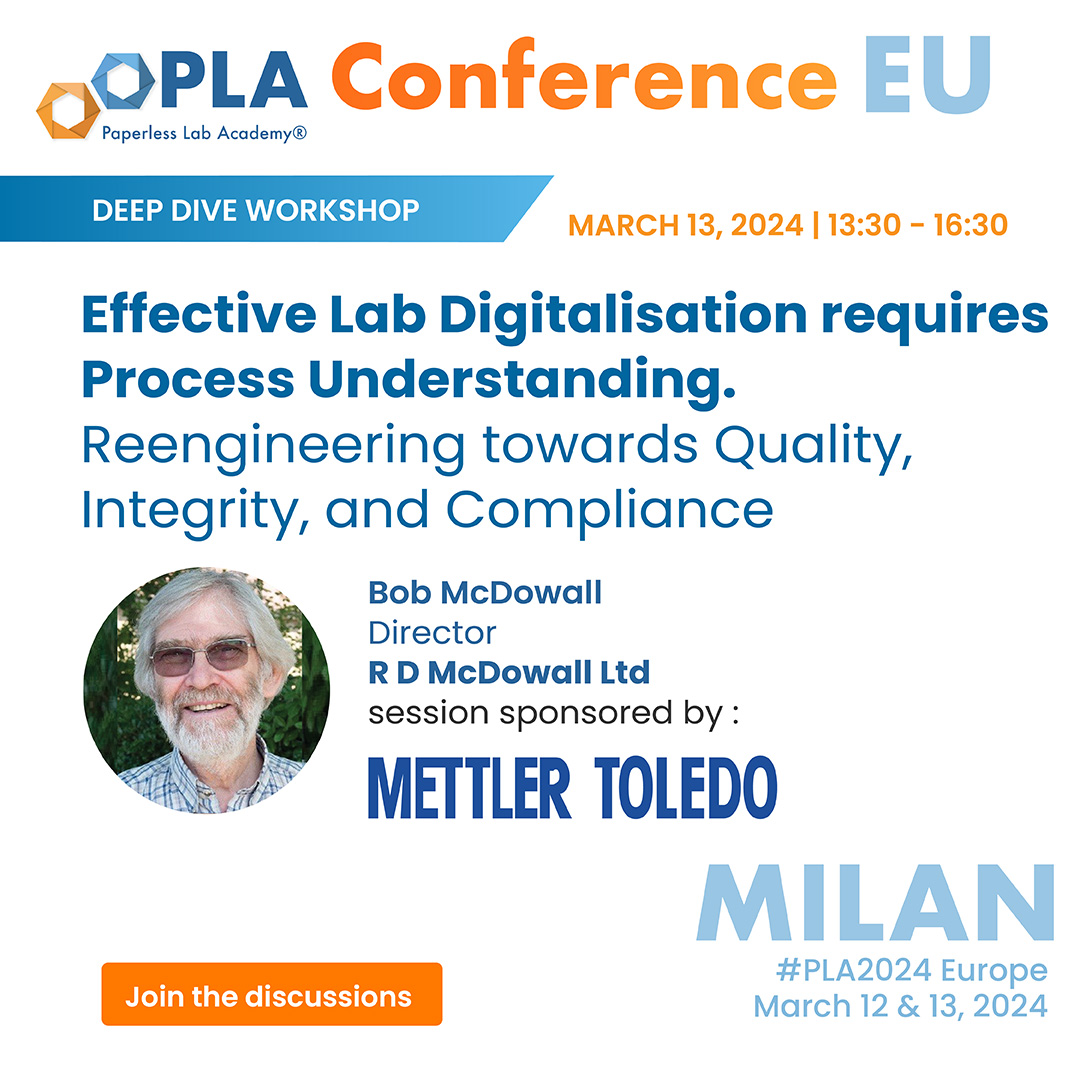Hands on Lab Digitisation

The digital laboratory transformation journey is a comprehensive process driven by technological advances and the growing need for efficient and streamlined scientific workflows. This transformation involves investing in the basic foundations of the laboratory infrastructure to harness the power of digital tools and data management systems. The main goal is to improve productivity, collaboration and the overall efficiency of laboratory processes.
The digitalisation of laboratory processes is not without its challenges. Laboratories generate huge amounts of data that need to be managed, analysed and securely stored. In addition, laboratory processes require complex workflows, compliance with strict regulations and interdisciplinary collaboration between scientists, engineers and data analysts.
The PLA2024Europe program proposes to tackle these challenges, which require more than just the implementation of digital tools; it requires a holistic approach where ecosystem thinking comes into play.
The PLA2024Europe includes 2 separate deep dive workshop sessions this March in Milan
The 11th edition of the PLA2024Europe programme includes two in-depth workshops.
These sessions offer the opportunity to better understand the “how” and “why” of things that could be done differently.
Deep dive Workshop: Instrument Connectivity and Data Management at Scale using Standards
This deep dive workshop aims for preparing you for the application of laboratory digitisation on a large scale through the use of data and communication standards.
You will learn about:
- How the application of scalable patterns can accelerate your digitisation efforts. This includes instrument connectivity and data management using the SiLA and AnIML standards.
- How to collect data from instrument PCs in an analytical or biological laboratory and store it in a secure central location.
- How data can be integrated into leading systems such as LIMS and ELN to reduce manual transcription.
- How to apply the FAIR principles to your data to maximise its value.
As you go through these points, you will understand the role of data and communication standards in facilitating this process.
The session will begin with an overview of SiLA and AnIML standards. We will then explore the use of repeatable patterns to apply laboratory digitisation at scale and conclude with a live session using real instruments
Deep Dive Workshop: Effective Lab Digitalisation Requires Process Understanding
Reengineering towards Quality, Integrity, and Compliance
Session sponsored by Mettler Toledo
There is no point in introducing a computerised system if it does not bring significant business benefits. Consequently, it is not a good idea to automate the current analysis process as it could probably be improved in terms of speed, efficiency and therefore productivity and quality.
Furthermore, it is unlikely that the current business processes in a laboratory can be effectively automated if computerised systems are used in hybrid mode (signed paper printouts of electronic records), paper records are transcribed, and manual entries are made in one or more spreadsheets.
Understanding your processes is a crucial but often overlooked component of laboratory automation and digitalisation
The session will present a methodology that can be used to map a process in an analytical laboratory. Examples of existing or as-is processes and how to capture the associated information required for a redesign will then be shown and critically evaluated.
When redesigning, the following three principles must be observed:
- Data Capture at the Point of Origin: How to eliminate a writing a record on paper but a direct data entry into a computer system.
- Data Transcription: Once data are electronic, they should remain electronic. Printing and retyping to another computer system should be banished from any standard operating procedure.
- Data Life Cycle: Know Where the Data Go. Easy and quick retrieval at any time; this may require naming conventions for locations, data files etc.
Implicit in these principles is that quality, integrity and compliance with quality standards and regulations are designed into the process.
In summary, the deep dive workshops are a fundamental element of the PLA2024Europe program.
With the in-depth approach offered by the workshops, participants are supported in facing new challenges in the field of laboratory digitalisation, implementing new strategies for digital transformation and generally improving the digital mindset in the laboratory.
We look forward to seeing you at PLA2024Europe!
<<<<VIEW HERE THE FULL PROGRAM >>>
Latest Posts
Key Topics of the PLA2024India
PLA2024India, 5th edition, promises a programme full of interactions and discussions. 4 focused sessions and 2 training workshops The main theme of #P
14 May 2024
Press Release: PLA® Conferences to partner with IA-Meetings for its 5th Indian Edition.
The Paperless Lab Academy® (PLA) is a leading conference about digital transformation of laboratory and quality processes. Above all, it is about mas
08 April 2024
The #PLA2024Europe programme aimed to highlight the importance of the human factor in digital transformation with several presentations and panel disc
19 March 2024



